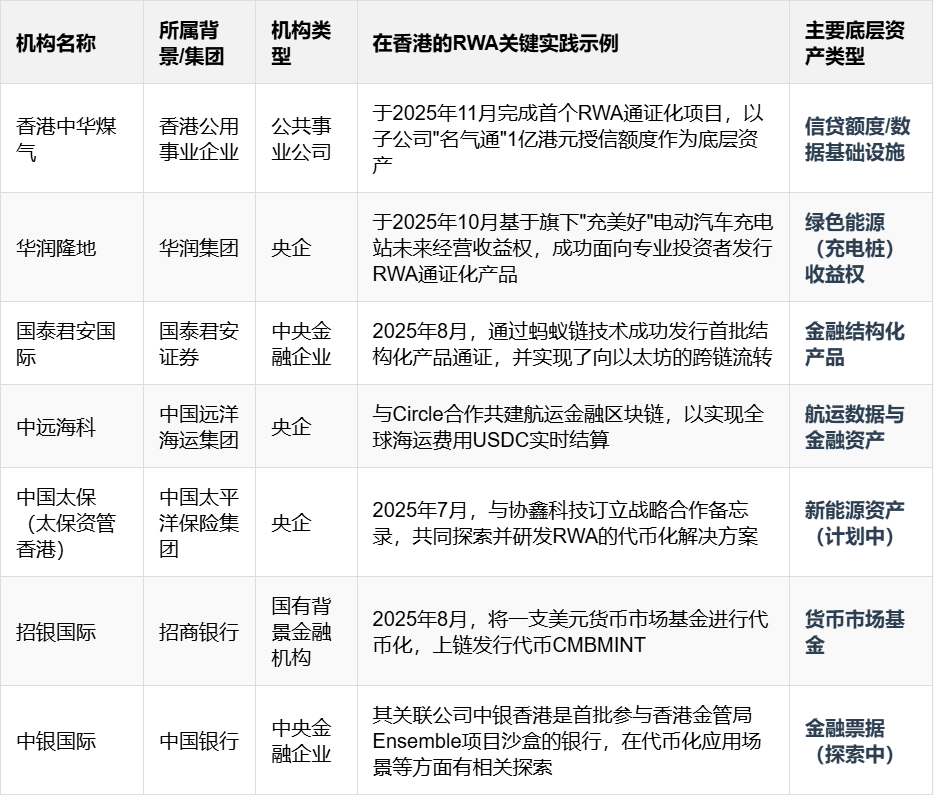撰文:梁宇
编审:赵一丹
香港金管局的「Ensemble」项目沙盒与最新「Fintech 2030」战略,构筑起政策高地,正吸引华润、中远海运等一批「国家队」成员,将庞大实体资产与金融专长转化为数字时代新竞争力。
根据中国新闻网11月3日报道,香港金融管理局在同日公布的「金融科技2030」策略中,明确将「促进金融代币化」列为四大支柱之一,旨在推动香港代币化生态系统的蓬勃发展。。与此同时,市场消息显示,央企华润隆地已基于旗下电动汽车充电站收益权发行RWA通证化产品,成为央企在该领域的一次标志性落地。
这一系列从市场实践到顶层政策的密集动态,清晰地表明香港正全力构建其数字金融生态。而在港的中央企业、国有企业及相关金融机构,凭借其独特的资产禀赋与政策敏锐度,已成为推动RWA生态发展的中坚力量。

表1:在港布局RWA的央(国)企及相关机构案例汇总
一、 政策基石:从战略宣言到实施细则
香港特区政府与监管机构构建了全球领先的数字资产政策框架,为RWA发展提供了清晰的制度环境。2025年6月发布的《数字资产发展政策宣言2.0》标志着香港数字资产政策进入系统化推进阶段,而11月公布的「Fintech 2030」策略则进一步细化了实施路径。
金管局对代币化政府债券的推进计划尤为具体。根据「Fintech 2030」策略,金管局将在2026年前完成代币化政府债券发行的制度化安排,包括建立专门的发行平台、制定合格机构投资者准入标准,以及明确代币化债券的二级市场交易规则。这一系列举措为其他资产的代币化提供了可参考的监管范式。
在稳定币监管方面,香港同样走在全球前列。2025年8月1日正式实施的稳定币发行人监管制度,为RWA提供了重要的支付结算工具。该制度要求稳定币发行人必须持有相应规模的储备资产,并定期接受第三方审计,确保了稳定币的价值稳定性。
金管局副总裁李达志在最近的金融科技周活动中透露,目前已有超过20家金融机构申请参与「Ensemble」沙盒计划,涵盖银行、券商、保险公司等多元主体。沙盒计划特别关注代币化资产在存管、结算和跨境交易中的应用,为后续监管规则的完善积累实践经验。
二、 产业实践:从试点项目到规模化探索
拥有庞大实体资产的产业集团是香港RWA生态中最活跃的参与者,它们通过将基础设施、数据资源等实体资产代币化,探索存量资产的价值释放新路径。
香港中华煤气的RWA项目展现了传统公共事业企业的创新转型。该公司选择的底层资产——名气通1亿港元授信额度,主要用于人工智能数据中心、AI物联网及跨境基础设施建设。通过将贷款信息上链,中华煤气实现了关键财务与营运数据的实时透明化,为后续更多资产代币化奠定了基础。
中华煤气执行董事暨首席财务总监在项目发布会上表示,「此次RWA通证化是集团数字化转型的关键一步,我们计划在未来三年内将更多符合条件的资产纳入代币化范畴,预计总规模可达50亿港元。」
华润集团旗下的华润隆地则专注于绿色能源领域。参与金管局「Ensemble」沙盒计划后,华润隆地正在开发基于电动汽车充电站收益权的RWA产品架构。该产品计划将分布在香港各区的充电桩未来收益进行打包代币化,投资者可通过持有代币分享充电服务收益。
中远海科的「航运链」平台已进入实质运营阶段。这个基于区块链技术的航运数据平台,目前已接入超过200家供应链企业,累计处理航运订单超1万笔。平台通过将提单、舱单等航运单证数字化,为后续的运力收益权代币化创造了条件。
中远海科数字化业务负责人透露,「我们正在与香港金管局沟通,计划在2026年第一季度推出首个基于航运数据的RWA产品,初步规模预计为5亿港元。」
三、金融创新:传统业务的重构与升级
金融机构利用其专业优势,推动传统金融产品的代币化进程,在提升效率的同时探索新的业务增长点。
国泰君安国际作为传统券商的代表,在RWA领域取得了标志性进展。根据《中国银行保险报》2025年9月23日报道,国泰君安国际已成功推出首批结构化产品通证,包括固定收益可赎回通证产品和挂钩美股ETF的保本型通证产品。这批产品采用蚂蚁数科的区块链技术与RWA解决方案,创新性地实现了通证在蚂蚁链与以太坊之间的跨链安全流转,所有交易数据公开透明、不可篡改,投资者可随时自主验证。此次发行被视为首个金融资产RWA的实践,其底层资产是国泰君安国际作为持牌金融机构发行的金融合约和承诺。此举不仅显著降低了传统发行中的中间环节成本,大幅提升清算与交割效率,更展示了中资券商在打通虚拟资产「交易、托管、咨询、发行及衍生品」全链条服务能力后的业务创新实力。
中国太保通过太保资管香港实现了「双重布局」。在推出香港首只链上货币基金「eStable MMF」后,该公司管理的链上资产规模在三个月内已达到2亿美元。与此同时,与协鑫科技合作的新能源资产包设计已进入最后阶段,预计首批规模为3亿港元。
太保资管香港首席执行官在近期业绩说明会上表示,「链上基金的成功发行证明了传统金融产品代币化的可行性,我们将继续探索保险资金通过RWA模式参与基础设施投资的新路径。」
招银国际的美元货币市场基金代币化项目展现了技术创新的价值。该项目通过智能合约实现了基金份额的自动清算和结算,将传统需要T+2的交易周期缩短至近乎实时。更重要的是,该系统支持美元、港元和离岸人民币的多币种申购赎回,为跨境投资者提供了极大便利。
中银国际的贸易金融数字化实践具有行业示范意义。该行基于区块链的贸易信用证平台已处理超过100笔跨境贸易融资业务,总金额达3亿美元。通过将传统纸质信用证数字化,中银国际将业务处理时间从5-7天缩短至24小时以内,同时大幅降低了人为错误和欺诈风险。
中银国际数字金融部负责人指出,「贸易金融是RWA的天然应用场景,我们正与香港金管局紧密合作,探索数字票据的标准化框架,预计明年将有具体成果。」
四、生态构建:多元主体的协同共进
香港RWA生态系统的完善得益于各类机构的积极参与,从技术支持到平台建设,各个环节都有专业机构深耕。
蚂蚁数科的Jovay Layer2区块链平台为RWA提供了关键技术支撑。该平台采用零知识证明技术,在保证交易透明性的同时保护商业隐私,每秒可处理超过5000笔交易。在中华煤气的RWA项目中,Jovay平台实现了关键数据的上链存证和授权访问,确保了信息的真实性和不可篡改性。
蚂蚁数科区块链业务总裁边卓群透露,「我们正在开发专门针对RWA的合规解决方案,包括投资者身份验证、交易额度管理和跨境合规检查等功能,预计明年第一季度可投入使用。」
香港数字资产上市公司联合会的成立促进了行业自律发展。这个由多家数字资产领域上市公司发起的组织,已制定RWA项目信息披露指引和投资者适当性管理规范,为行业健康发展奠定了基础。
联合会主席在近期论坛上表示,「我们正与香港证监会合作开发RWA项目评估框架,将从资产质量、技术安全、合规性等维度对项目进行综合评价,为投资者提供参考依据。」
创兴银行等中小型银行通过差异化策略参与 RWA 生态。除了为中华煤气项目提供授信支持外,创兴银行正在开发面向中小企业的 RWA 融资产品,计划通过将应收账款代币化,帮助中小企业解决融资难题。
五、现实挑战:发展进程中的瓶颈与突破
RWA在香港的发展仍面临多方面挑战,需要市场各方共同努力突破。
技术标准的不统一是目前最紧迫的问题。不同的区块链平台之间缺乏互操作性,导致代币化资产难以在不同系统间流转。香港金管局正在牵头制定RWA技术标准,预计将在2026年发布第一版标准框架,涵盖资产上链、代币发行、交易结算等关键环节。
金管局金融科技总监周惠强在近期技术研讨会上表示,「我们正与国际标准组织合作,确保香港的RWA标准与全球主流标准兼容,为跨境应用奠定基础。」
法律与合规问题同样需要突破。数字资产在法律上的定性、跨境交易的司法管辖权、投资者权益保护等都需要明确。香港律政司正在起草数字资产相关法律修正案,计划在2026年提交立法会审议。
在跨境监管协调方面,香港证监会与内地监管机构建立了定期沟通机制,就RWA的跨境监管问题交换意见。这种协调机制有助于在保障金融安全的前提下推动创新。
市场接受度的提升需要时间。根据香港数字资产交易所的调研数据,目前机构投资者对RWA的认知度已达75%,但实际参与投资的仅占25%。投资者教育成为推动市场发展的关键环节。
多家机构正在合作开发投资者教育材料,通过案例分析和风险提示,帮助传统投资者理解 RWA 产品的特点和风险。香港投资者教育中心计划在明年推出专门的 RWA 投资教育项目。
六、未来前景:从香港实践到全球引领
香港RWA生态的发展呈现出清晰的演进路径,从试点到规模化,从本地到跨境,影响力逐步扩大。
多元化资产拓展将成为未来主线。除了当前的绿色能源、航运金融等领域,香港正探索知识产权、碳资产等新型资产的代币化。香港交易所计划在2026年推出数字资产交易平台,首批将纳入符合标准的RWA产品。
跨境应用特别是与内地的联通具有巨大潜力。在「一带一路」倡议和人民币国际化背景下,香港有望成为内地资产跨境流动的数字枢纽。多家机构正在研究通过RWA模式将内地基础设施资产引入国际市场的可行方案。
香港大学金融学教授在近期研究中指出,「香港独特的‘一国两制’优势使其能够充当数字资产领域的‘超级联系人’,通过RWA促进内地与全球市场的资产互联互通。」
规模化发展需要政策与市场双轮驱动。金管局计划在2027年前推动代币化资产规模达到千亿港元级别,并通过税收优惠等政策措施吸引更多机构参与。同时,香港正在培育专业的RWA服务机构生态,从技术支持到法律咨询,形成完整的产业链。
香港财政司司长在最近的经济论坛上强调,「资产代币化是金融未来的重要方向,香港将继续完善监管框架,培育市场生态,巩固我们在数字金融领域的领先地位。」
从华润隆地的电动汽车充电站到中远海科的航运链,从太保的链上基金到中华煤气的数字融资,香港的RWA版图正在由一批央国企和金融机构勾画出新蓝图。
随着「Fintech 2030」战略的推进,香港的 RWA 生态将日益完善。未来,我们或将看到更多类型的实体资产被代币化,从基础设施到新能源,从数据资源到知识产权,一个连接现实世界与数字世界的金融新生态正在香江岸边加速形成,为香港国际金融中心地位注入新的时代内涵。
部分资料的文章来源:
·《香港计划将代币化政府债券的发行常态化》
·《香港发表数字资产发展政策宣言2.0 稳定币成重点》
·《香港金管局「数码港元」先导计划取得丰富成果》
免责声明:本文章仅代表作者个人观点,不代表本平台的立场和观点。本文章仅供信息分享,不构成对任何人的任何投资建议。用户与作者之间的任何争议,与本平台无关。如网页中刊载的文章或图片涉及侵权,请提供相关的权利证明和身份证明发送邮件到support@aicoin.com,本平台相关工作人员将会进行核查。



